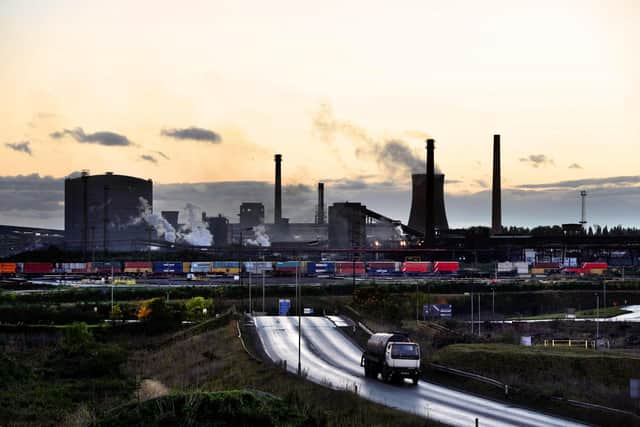Thousands of jobs at risk as British Steel announces decarbonisation plans
The company’s Chinese owners, Jingye, has put forward proposals to decarbonise its operations "subject to appropriate support from the UK Government".
British Steel’s proposal will see them replace traditional blast furnaces with two electric arc furnaces (EAFs) - one at Scunthorpe and the other on Teesside.
Advertisement
Hide AdAdvertisement
Hide AdEAFs use recycled steel as a feedstock in a process which releases less carbon and uses less electricity, although unions are concerned about the impact the less-labour intensive process will have on jobs in the steelmaking industry.


Professor Christopher Bovis FRSA Professor of International and European Business Law at the University of Hull told The Yorkshire Post: “Regrettably, the UK is at least a decade late in utilising subsidies and state aid to modernise the production of steel, which in many countries in Europe and across the world, is perceived as a strategic industry.”
It’s thought British Steel’s proposals will lead to a loss of up to 2,000 jobs, most of which will be at its Scunthorpe site.
A Government spokesperson said: "Our commitment to the UK steel sector is clear, and we continue to work closely with industry, including British Steel, to secure a sustainable and competitive future for the sector and its workers.
Advertisement
Hide AdAdvertisement
Hide Ad"We have offered a generous support package including more than £300 million of investment for British Steel to cut emissions, help safeguard jobs and unlock over £1 billion in stakeholder investment.
"Ultimately, it is for British Steel to manage commercial decisions for the future of the company, and we cannot comment on ongoing commercial negotiations beyond that."
In September, the government announced a package of support worth £500m to rival steel company Tata to support plans to close blast furnaces in Port Talbot. The closure of Port Talbot’s blast furnaces is expected to lead to the loss of 3,000 jobs from Tata’s 8,000 strong UK workforce.
British Steel CEO and President, Xijun Cao, said: “Decarbonisation is a major challenge for our business but we are committed to manufacturing the home-made, low-embedded carbon steel the UK needs.
Advertisement
Hide AdAdvertisement
Hide Ad“We have engaged extensively with the public and private sector to understand the feasibility of producing net zero steel with our current blast furnace operations. However, thorough analysis shows this is not viable.”
Mr Xijun showed concerns about the UK Government’s policy strategy. “Governments in the countries where our major competitors operate have adopted [supportive] policies and the longer we wait for their implementation in the UK, the more impact and challenge this will have on our competitiveness and the country's ability to meet its carbon objectives.
“We remain in talks with the government and, with its support, are committed to making the steel Britain needs for generations to come.”
Trade union Community has said the closure of blast furnaces would leave the UK reliant on “dirty steel imports from a turbulent and unreliable international market.”
Advertisement
Hide AdAdvertisement
Hide AdIn response to yesterday’s British Steel announcement, Community General Secretary Roy Rickhuss said: “It is deeply disappointing that once again our members first heard of these plans through irresponsible leaks to the media.
“Community firmly believes that the blast furnaces continue to be vital in any responsible transition to green steelmaking.”
Teesside’s beam mill currently processes steel manufactured in Scunthorpe. Thousands of jobs were lost when Redcar’s nearby steelworks closed in 2015, marking the end of a long history of steel production on Teesside.
Redcar MP, Jacob Young said the potential renewal of steelmaking in his constituency was “testament to the enduring spirit and resilience of Teesside - a region that simply will not stay down.
Advertisement
Hide AdAdvertisement
Hide Ad"I am immensely proud to see our community taking this significant stride forward, ensuring that the steel industry, which was the backbone of our economy for generations, will continue to thrive for many more to come.”
Comment Guidelines
National World encourages reader discussion on our stories. User feedback, insights and back-and-forth exchanges add a rich layer of context to reporting. Please review our Community Guidelines before commenting.
